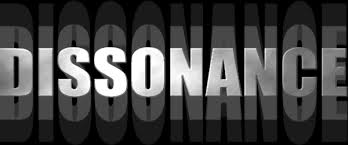
记忆方法
将“dissonance”分解为“dis”(表示否定或分开)和“sonance”(来自“sonic”,与声音有关)。想象一个声音或音乐出现“dis”(不)协调或分开,形成了不和谐的“dissonance”。这样的联想可以帮助记忆这个单词的含义。
以上内容由AI生成, 仅供参考和借鉴
中文词源
dissonance 不和
dis-, 不,非,使相反。-son,声音,词源同sound, consonance. 即不同的声音,引申词义不和。
英语词源
- dissonance (n.)
- early 15c., "disagreement," from Middle French dissonance and directly from Late Latin dissonantia, from Latin dissonantem (see dissonant). Figurative use dates from 1875.
权威例句
- 1. Dissonance among the three partners doomed the project.
- 三个股东间的不调和注定了那计划的失败.
- 2. Cognitive dissonance is also applied to a perceived incongruity between a person's attitudes and his behaviour.
- 认识分歧也用于指一个人的态度和他的行为之间可以看得出来的不一致.
- 3. The concerts were more enjoyable without all the horrid modern dissonance which nobody really understood.
- 音乐会里已经没有那些叫人头痛谁都听不懂的现代派不谐和音,所以更好听了.
- 4. In acoustics he studied the propagation of sound and musical consonance and dissonance.
- 在声学中,他研究了声的传播和音乐的和谐与不和谐.
- 5. The resolution of one dissonance is often the preparation for another dissonance.
- 一个不和谐音转变为和谐音常常是为另一个不和谐音做铺垫.
